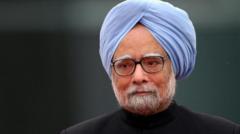Former Indian Prime Minister Manmohan Singh passed away at the age of 92, leaving behind a complex legacy as the architect of significant economic reforms. Serving as premier from 2004 to 2014, Singh was instrumental in liberalizing India’s economy, which began during his tenure as finance minister in the early 1990s. His health had been reportedly declining, prompting hospitalization in New Delhi before his death.
Singh, a distinguished scholar, was born in a remote village in what is now Pakistan on September 26, 1932. He overcame considerable obstacles to pursue higher education at prestigious institutions, including Panjab University, the University of Cambridge, and Oxford, where he earned a DPhil. His humble beginnings shaped his character and political philosophy, emphasized by his daughter's recollections of his frugal lifestyle as a student.
His rise to political prominence began when he was appointed finance minister in 1991 during a critical juncture for India, which faced potential bankruptcy. Singh implemented a series of reforms that included tax cuts, currency devaluation, and increased foreign investment, pulling India out of severe economic crisis and paving the way for sustained growth in the following decades.
Despite his achievements, Singh's tenure was marked by challenges, notably during his second term. Accusations of corruption involving his administration led to significant political opposition, contributing to the Congress party's electoral defeat in 2014. Critics labeled him as a weak leader, often positioning Sonia Gandhi, the Congress president, as the real power behind his premiership.
Singh was a key figure in international relations, notably signing a landmark nuclear agreement with the United States and continuing diplomatic engagement with neighboring nations, including Pakistan and China. His approach was often characterized by a preference for consensus-building and negotiation, though critics argued he was indecisive, particularly in the face of mounting scandals that characterized the latter years of his administration.
Post-premiership, Singh remained a respected figure within the Congress party, advocating for various socio-economic measures, particularly in response to the pandemic's economic impact. He maintained a low public profile and was known for his quiet demeanor, but his contributions to India's economic landscape are undeniably significant.
Singh is survived by his wife and three daughters, leaving an intricate legacy that blends economic triumph with political controversies, ensuring that his impact on India will be felt for decades to come.
Singh, a distinguished scholar, was born in a remote village in what is now Pakistan on September 26, 1932. He overcame considerable obstacles to pursue higher education at prestigious institutions, including Panjab University, the University of Cambridge, and Oxford, where he earned a DPhil. His humble beginnings shaped his character and political philosophy, emphasized by his daughter's recollections of his frugal lifestyle as a student.
His rise to political prominence began when he was appointed finance minister in 1991 during a critical juncture for India, which faced potential bankruptcy. Singh implemented a series of reforms that included tax cuts, currency devaluation, and increased foreign investment, pulling India out of severe economic crisis and paving the way for sustained growth in the following decades.
Despite his achievements, Singh's tenure was marked by challenges, notably during his second term. Accusations of corruption involving his administration led to significant political opposition, contributing to the Congress party's electoral defeat in 2014. Critics labeled him as a weak leader, often positioning Sonia Gandhi, the Congress president, as the real power behind his premiership.
Singh was a key figure in international relations, notably signing a landmark nuclear agreement with the United States and continuing diplomatic engagement with neighboring nations, including Pakistan and China. His approach was often characterized by a preference for consensus-building and negotiation, though critics argued he was indecisive, particularly in the face of mounting scandals that characterized the latter years of his administration.
Post-premiership, Singh remained a respected figure within the Congress party, advocating for various socio-economic measures, particularly in response to the pandemic's economic impact. He maintained a low public profile and was known for his quiet demeanor, but his contributions to India's economic landscape are undeniably significant.
Singh is survived by his wife and three daughters, leaving an intricate legacy that blends economic triumph with political controversies, ensuring that his impact on India will be felt for decades to come.





















